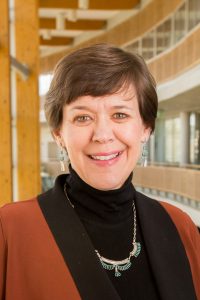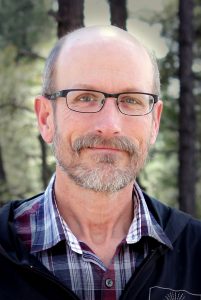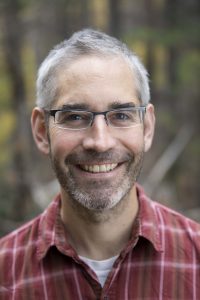April 9, 2019
At President Rita Cheng’s recommendation, the Arizona Board of Regents has approved three professors to be promoted to the rank of Regents’ Professor, the highest rank a faculty member can achieve.
Nominees must be full professors, have outstanding achievements and be distinguished nationally and internationally in their fields. No more than 3 percent of faculty have achieved this rank. Of those joining this elite group, one is a leading expert on participatory public health research among Native American communities, another is internationally known for his research in fire ecology and forest restoration, and the third is one of the world’s foremost scholars on phenology and is one of the most highly cited researchers in his field.
“These professors represent the elite of their fields and demonstrate the top-tier faculty we have at Northern Arizona University,” President Cheng said. “Their research and scholarship have changed the world and our understanding of their respective fields, as well as the lives and the careers of the students and faculty members they have mentored. This recognition is truly well-deserved.”
To achieve the rank of Regents’ Professor, nominations are submitted by tenured faculty members and sent to a committee, which evaluates each nomination. President Cheng considers the review and recommendations from the committee and determines which names should go to the Board of Regents for consideration. The Board of Regents is scheduled to provide final approval of these professors at its meeting Thursday in Tucson.
Julie Baldwin
Baldwin, a professor in the Department of Health Sciences in the College of Health and Human Services, is the founding director of the Center for Health Equity Research and lead principal investigator (PI) for the Southwest Health Equity Research Collaborative, which is funded by a $21 million grant from the National Institute on Minority Health and Health Disparities. Her work includes community-based participatory research with Native American tribes, public health, substance abuse prevention, diabetes and cancer prevention, behavioral health and oral health.
Throughout Baldwin’s career, she has been a PI on grants totaling $45.3 million, authored 79 journal articles and 18 book chapters and given more than 100 invited lectures throughout the world. Her team was recently commissioned by the NARBHA Institute and the Northern Arizona Healthcare Foundation to conduct a regional needs and assets assessment in northern Arizona, which represents a synthesis of data from almost 60 agencies.
“I am so honored and thrilled to have been selected as a Regents’ Professor at NAU; it has been a lifelong dream,” Baldwin said. “I am truly grateful to Dean Lynda Ransdell for nominating me as well as the screening committee, President Cheng and the Board of Regents for selecting me. This would not have been possible without the support and encouragement of my family, friends, colleagues, staff, students, mentees and mentors over the years. As a tribally enrolled woman who is a public health scientist, teacher, and practitioner, I hope I will pave the way for others like myself to become Regents’ Professors at NAU!”
Baldwin has developed and taught a number of courses during her time at NAU, including courses for a statewide master of public health program, and developed nationally disseminated curricula on the prevention of AIDS and substance abuse among Native Americans and materials for multiple behavioral health-related courses.
Peter Fulé
Fulé, the inaugural Charles O. and Mary Minor Endowed Professor in the School of Forestry, is an internationally recognized expert in restoration ecology and fire ecology; he has worked in the Grand Canyon, the Sierra Madre of Mexico, Patagonia in Argentina, the Sumatran rain forests in Indonesia, the mountains of Spain and Greece and the Himalayas, studying fire-adapted forests that provide a vital habitat to a variety of planet and animal life and people. He studies forest changes over centuries, testing restoration treatments and simulating changes centuries into the future to help society preserve critical ecosystem services.
Throughout his career, Fulé has been awarded $13.8 million in grant funding for his research, and he has been the PI or co-PI of 23 funded proposals. He has authored or co-authored 285 refereed journal articles and six book chapters, with his research appearing in Science, Ecological Applications, Ecology, International Journal of Wildland Fire and Forest Ecology and Management. He also has worked on significant research projects with the Mescalero and White Mountain Apache tribes, the Hualapai Tribe and the Navajo Nation to help them prepare for and recover from devastating fires.
Fulé has taught courses in fire ecology at universities throughout the world, including Vietnam, Spain, Finland and Mexico, with three overseas semesters through the University Studies Abroad Consortium, of which NAU is a partner. He regularly takes students into the field to do research, including research trips to other countries, and has made engaging with Native American communities, creating international relationships and collaborating with natural resource managers a priority in his work.
“I feel fortunate to have been able to pursue a career of research and teaching focused on the magnificent forests of the Southwest and many other parts of the world, with terrific students and colleagues,” Fulé said. “It is a great honor to have this work recognized through the professorship. I look forward to more opportunities ahead for learning and sharing about ways to deal with future challenges to natural ecosystems and our societies that depend on them.”
Andrew Richardson
Richardson, who came to NAU from Harvard University, is a professor in the School of Informatics, Computing, and Cyber Security (SICCS) and the Center for Ecosystem Science and Society (Ecoss). He studies forest science and ecophysiology, with his research incorporating plant biology, earth system science, computer science, remote sensing, applied mathematics, engineering, atmospheric science and micrometeorology. He is a world-renowned expert in phenology, the study of seasonal rhythms of plants and animals in various ecosystems. Richardson created PhenoCam, a system of networked digital cameras that have more than 500 sites through North America that monitor vegetation phenology at the ecosystem scale. PhenoCam is supported by $2 million in grants and contracts and all of the data collected, including more than 30 million images, are publicly available in near real-time for use in research and community.
The framework for PhenoCam, which combines strengths from biological and ecological sciences and programming and data sciences, is being adopted as a core measurement strategy in long-term global research networks throughout the world.
In 2018 alone, Richardson earned grants from several major federal agencies, bringing in $9.7 million in external awards to fund his research. He has published more than 190 peer-reviewed papers and Clarivate Analytics has identified him as a highly cited researcher in environment/ecology and agricultural sciences. He has received more than $40 million in grant funding in his career.
Richardson, who said his first reaction to the news that he had been selected for this honor was disbelief and to ask a coworker to verify that it was President Cheng’s voice on the message, has made significant discoveries and leading-edge contributions to research related to terrestrial ecosystem carbon cycling. The basic science underlying his work is helping to shape the field of carbon management and is leading to a reassessment of the role old nonstructural carbons play in supporting tree growth and metabolism.
“There are a lot of really exciting developments at NAU these days, and it is amazing to be part of this energetic and vibrant academic community,” Richardson said. “I am very fortunate to have wonderful colleagues in SICCS and Ecoss and a great lab group that I work with every day. Being appointed as a Regents’ Professor is a tremendous honor, and I am thrilled to have my academic work recognized with this distinction.”

(928) 523-8737 | heidi.toth@nau.edu
Regents Professors at NAU
Russell P. Balda, Biological Sciences (retired)
J. Dale Nations, Geology (retired)
William J. Roosen, History (retired)
Stanley S. Beus, Geology (retired)
Lawrence M. Perko, Mathematics (retired)
Monte M. Poen, History (retired)
Gina P. Cantoni, Bilingual/Multicultural Ed. (retired)
Lloyd Mogenson, Biological Sciences (retired)
James Sexton, Anthropology (retired)
Dickson A. Mungazi, Education (retired)
Peter W. Price, Biological Sciences (retired)
William W. Covington, Forestry
Robert T. Trotter, Anthropology
Thomas G. Whitham, Biological Sciences
Graydon Lenn Berlin, Geography and Public Planning (retired)
Dean W. Blinn, Biological Sciences (retired)
Donald V. Bendel, Fine Arts – Ceramics (retired)
Curtis M. Hinsley, History (retired)
Michael Eastman, Chemistry (retired)
Jill Dubisch, Anthropology (retired)
Stan Lindstedt, Biological Sciences (retired)
Michael Wagner, Forestry (retired)
Douglas Biber, English 2000-01
Thomas McPoil, Physical Therapy (retired)
Zachary Smith, Political Science
Karen VanWinkle-Swift, Biological Sciences (retired)
Paul Keim, Biological Sciences
Kiisa Nishikawa, Biological Sciences
Jim Simmerman, English (retired)
Lee Drickamer, Biological Sciences (retired)
Raymond Michalowski, Criminal Justice
William Grabe, English (retired)
Paul Beier, School of Forestry
Edith Copley, School of Music
Darrell Kaufman, Geology
Bruce Hungate, Biological Sciences
Nancy Johnson, Biological Sciences





